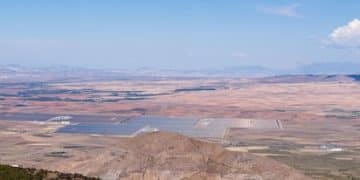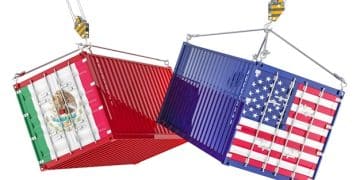Mexico’s Political Climate: Impact on US Relations

Mexico’s evolving political climate, marked by shifts in leadership and policy, significantly influences its diplomatic relations with the United States, particularly concerning trade, security, and migration challenges across their shared border.
The intricate dance of international relations often hinges on the domestic conditions of a nation. For the United States, few countries exemplify this truth more profoundly than its southern neighbor. Understanding how will the current political climate in Mexico affect US diplomatic relations is not merely an academic exercise; it is a critical endeavor that directly impacts bilateral trade, border security, migration policies, and even regional stability.
Advertisements
Understanding Mexico’s Political Landscape
Mexico’s political landscape is a dynamic and multifaceted ecosystem, profoundly shaped by its history, demographics, and economic realities. The country operates under a presidential system, where the President serves a single six-year term, holding significant power in shaping domestic and foreign policy. This political structure, combined with a vibrant multi-party system, means that shifts in leadership can bring about substantial changes in national direction and, consequently, in its approach to international relations, particularly with the United States.
The incumbent administration has emphasized a more autonomous foreign policy, often prioritizing domestic development and social programs. This stance can sometimes lead to different perspectives on issues that are traditionally central to the US-Mexico agenda, such as energy policy or foreign investment. Understanding these internal drivers is key to anticipating Mexico’s diplomatic posture going forward.
Key Political Actors and Their Influence
Several key players significantly influence Mexico’s political trajectory. Beyond the President, the legislative branch, composed of the Chamber of Deputies and the Senate, plays a crucial role in approving treaties, budget allocations, and major policy initiatives. State governors and municipal leaders also wield considerable power, especially in areas like security and local economic development, often directly impacting cross-border dynamics.
- The President: Sets the overall tone and direction for foreign policy, with significant influence over diplomatic appointments and international agreements.
- Legislative Branch: Approves international treaties, budgets, and laws that have direct implications for bilateral relations, such as trade agreements or security cooperation protocols.
- State Governments: Particularly those bordering the U.S., they are frontline actors in managing migration, commerce, and security issues that directly affect diplomatic relations.
- Judiciary: While often less visible in daily diplomatic headlines, its rulings on legal frameworks and investor protections can indirectly influence foreign investment and trade confidence.
The interplay among these actors, often characterized by negotiation and occasional confrontation, paints a complex picture of governance. Public opinion, driven by media narratives and social movements, also exerts pressure on political decisions, creating a feedback loop that policymakers must consider. This layered influence means that any analysis of Mexico’s political climate must look beyond just the executive branch to understand the full scope of potential impacts on US diplomatic relations.
Economic Interdependence and Political Synchronization
The economic relationship between Mexico and the United States is arguably one of the most deeply integrated in the world, far surpassing mere trade figures. This interdependence is a fundamental cornerstone of their bilateral relations, driving policy decisions and often influencing diplomatic synchronicity, or lack thereof. The United States is Mexico’s largest trading partner, and Mexico is the second-largest goods trading partner for the U.S., making their economic health inextricably linked. Cross-border supply chains, particularly in sectors like automotive and electronics, mean that economic shifts in one nation almost immediately ripple across the border to the other.
This deep economic integration means that political decisions in one country can have profound and immediate effects on the other. For instance, changes in trade policy, such as tariff adjustments or modifications to labor laws, directly impact businesses and consumers in both nations. Similarly, shifts in economic priorities within Mexico, like increased state control over certain industries or altered foreign investment regulations, naturally draw close attention from Washington, as these can affect American corporate interests and broader economic stability in the region.
NAFTA/USMCA and Beyond
The North American Free Trade Agreement (NAFTA), now the United States-Mexico-Canada Agreement (USMCA), serves as the bedrock of this economic relationship. Its renegotiation underscored the sensitivities and priorities of both nations. For Mexico, the USMCA aimed to solidify its access to the vast U.S. market and attract further direct foreign investment, while for the U.S., it sought to rebalance trade flows and ensure fair labor practices. The successful navigation of this complex renegotiation process demonstrated a pragmatic willingness on both sides to adapt to evolving economic realities, despite political differences.
However, beyond the framework of USMCA, emerging political priorities within Mexico can introduce new variables. Discussions around energy sovereignty, for example, which aim to strengthen state-owned energy companies (PEMEX and CFE), have raised concerns among U.S. investors about predictability and fair competition. These domestic policy choices, while framed as national interest, inevitably spill over into the diplomatic sphere, requiring careful negotiation and clarification to avoid commercial disputes and maintain a robust investment climate.
The pursuit of economic nationalism in Mexico, even if domestically popular, can present challenges to the seamless cross-border flow of goods, services, and capital that has become the hallmark of the bilateral relationship. Balancing these internal priorities with the imperatives of sustained economic integration will be a continuous diplomatic challenge, requiring open communication and a shared understanding of mutual benefits. When political synchronization on economic priorities falters, the economic benefits of interdependence can become overshadowed by friction, affecting diplomatic goodwill and cooperation on other critical issues.
Security Concerns and Shared Borders
The shared 2,000-mile border between the United States and Mexico is a complex interface, simultaneously a conduit for trade and migration, and a focal point for security challenges. The political climate in Mexico directly influences the effectiveness of bilateral efforts to combat transnational crime, drug trafficking, and human smuggling. For both nations, a stable and secure border is paramount, yet the approaches and priorities of their respective governments can sometimes diverge, necessitating nuanced diplomatic engagement.
Mexico’s internal security strategy, particularly its approach to combating organized crime and corruption, has a direct bearing on U.S. national security interests. When Mexican political leadership prioritizes certain strategies, such as focusing on addressing the root causes of crime through social programs rather than direct confrontation, it can lead to different operational outcomes on the ground. These differences in approach do not necessarily equate to a lack of cooperation but rather require continuous dialogue and alignment on shared objectives, such as reducing the flow of illicit drugs into the U.S. and curbing arms trafficking from the U.S. into Mexico.
Drug Trafficking and Organized Crime

The fight against drug trafficking remains a defining element of the U.S.-Mexico security agenda. The political will and resources that Mexico commits to this fight are constantly scrutinized by Washington. Changes in rhetoric or strategy from the Mexican presidency regarding drug cartels, for instance, can raise concerns or inspire confidence in their U.S. counterparts. Diplomatic efforts frequently revolve around coordination on intelligence sharing, law enforcement training, and joint operations to dismantle criminal networks that operate across both territories.
- Intelligence Sharing: Crucial for identifying and targeting high-value criminal targets and preventing illicit flows.
- Law Enforcement Training: Enhances the capabilities of Mexican security forces to combat sophisticated criminal organizations.
- Joint Operations: Direct collaboration on specific cases or areas, leading to more immediate results in disrupting criminal activities.
- Preventive Measures: Addressing socio-economic conditions that make individuals vulnerable to recruitment by organized crime, though these results are often long-term.
The effectiveness of these joint endeavors depends heavily on the political trust and commitment from leadership on both sides. A shift in Mexico’s political climate that either strengthens or weakens its security institutions or alters its enforcement priorities directly impacts the U.S.’s ability to safeguard its borders and combat the supply of illegal narcotics within its own territory. This interplay demands frequent, high-level diplomatic exchanges to ensure alignment and address any emerging discrepancies in strategy or resource allocation.
Moreover, the influx of firearms from the U.S. into Mexico, fueling cartel violence, is a reciprocal concern that necessitates diplomatic attention. Mexican political leaders often highlight this issue, pressuring the U.S. to take more stringent measures against illegal gun trafficking. The degree to which Mexico’s current political climate emphasizes this issue can shape the bilateral security dialogue, pressing the U.S. for greater engagement on its end of the supply chain of violence.
Migration and Humanitarian Challenges
Migration stands as one of the most sensitive and publicly visible facets of U.S.-Mexico relations, profoundly influenced by the political climate in both countries. Mexico, traditionally a country of emigration, has increasingly become a transit country and, for some, a destination, for migrants from Central and South America, and even further afield. The sheer volume of individuals moving through Mexico towards the U.S. border creates immense humanitarian and logistical challenges that require continuous bilateral cooperation, often shaped by domestic political narratives and pressures.
The approach of the Mexican government to migrant flows, whether through stricter enforcement, increased asylum processing, or humanitarian aid, directly impacts the flow of migrants arriving at the U.S. southern border. For the United States, managing this flow is a top political priority, often becoming a contentious issue in domestic politics. Therefore, any shifts in Mexican policy or capacity regarding migration management instantly reverberate in Washington, necessitating rapid diplomatic engagement and coordination.
Managing Border Flows and Asylum Seekers
The current political climate in Mexico has seen varying approaches to migration. While there has been an emphasis on human rights and offering support to vulnerable migrants, there have also been periods of increased enforcement, often in response to perceived U.S. pressure or internal logistical strains. These policy nuances directly affect the challenges faced by U.S. border agencies and the resources required to process asylum claims and manage border crossings.
- Asylum Processing: Mexico’s capacity and willingness to process asylum claims domestically can significantly reduce pressure on the U.S. asylum system.
- Migrant Shelters and Aid: The provision of humanitarian aid and safe spaces in Mexico impacts the welfare of migrants and can influence their continued journey.
- Enforcement Policies: Mexico’s border control efforts, including interdictions and deportations, directly affect the volume of migrants reaching the U.S. border.
- Root Cause Engagement: Diplomatic efforts increasingly focus on addressing the socio-economic and security issues in migrant-sending countries to reduce overall migratory pressures.
The delicate balance between humanitarian concerns and border security imperatives often becomes a point of negotiation and occasional strain in bilateral diplomatic relations. When one country’s political climate dictates a more restrictive or more permissive approach, it necessitates significant adjustments in the other. For instance, if Mexico’s political leadership shifts towards a more lenient stance on transit, U.S. officials may seek increased collaboration on intelligence sharing or joint border patrols to manage potential surges.
Conversely, U.S. domestic political rhetoric and policies on migration also significantly influence Mexico’s actions. The threat of tariffs or economic pressure, while rarely implemented, can sometimes push Mexican authorities to intensify their efforts to curb irregular migration. Diplomatic efforts in this domain are therefore a constant negotiation of shared responsibilities, resource allocation, and the management of public expectations, all filtered through the lens of each nation’s domestic political priorities and the humanitarian imperative.
Energy and Environmental Diplomacy
Beyond the immediate considerations of trade, security, and migration, the political climate in Mexico also profoundly impacts broader areas of diplomatic cooperation, particularly in energy and environmental policy. These sectors are increasingly critical for both nations’ long-term prosperity and stability, and shared borders mean that actions taken by one invariably affect the other. The approach of current and future Mexican administrations to energy independence, renewable energy development, and environmental protection directly influences regional initiatives and investment opportunities for U.S. entities.
Mexico’s energy sector has undergone significant reforms in recent decades, with varying degrees of openness to foreign investment. The current political climate has shown a leaning towards strengthening state-owned companies, Pemex (oil) and CFE (electricity), often at the expense of private and foreign investment opportunities. This shift in policy can create friction with U.S. energy companies and investors who rely on predictable regulatory frameworks and fair competition. Diplomatic channels become essential for conveying concerns, seeking clarifications, and ensuring that legitimate investments are protected under international agreements.
Climate Change and Water Management
Environmental diplomacy is another area where Mexico’s political climate plays a decisive role. Both the U.S. and Mexico are vulnerable to climate change impacts, from severe droughts to extreme weather events. Cross-border environmental issues, such as shared water resources (e.g., the Colorado River and Rio Grande) and air quality in border cities, necessitate continuous collaboration. The degree of Mexican political commitment to climate action, including its adherence to international agreements and its national policies on emissions reduction, directly impacts the effectiveness of regional and global efforts.
- Renewable Energy Targets: Mexico’s commitment to and investment in renewable energy projects affects regional energy security and climate goals.
- Water Sharing Agreements: Diplomatic dialogue ensures equitable distribution of vital water resources, particularly in times of drought.
- Pollution Control: Joint efforts to combat air and water pollution in border areas mitigate health risks for communities on both sides.
- Conservation Initiatives: Collaboration on protecting biodiversity and shared ecosystems contributes to regional environmental resilience.
A Mexican political climate that prioritizes environmental protection and sustainable development aligns well with U.S. climate goals and fosters deeper diplomatic cooperation. Conversely, an administration that de-emphasizes environmental regulations or favors fossil fuel expansion could create areas of diplomatic tension, as the U.S. increasingly integrates climate considerations into its foreign policy. The shared responsibility for environmental stewardship along a vast border means that these issues are not merely domestic concerns but are central to the bilateral relationship.
Furthermore, major infrastructure projects proposed by either nation, particularly those related to energy or water, require extensive environmental impact assessments and cross-border consultation. The political willingness to engage in these discussions transparently and collaboratively is a key indicator of the health of environmental diplomacy. Any perceived unilateral actions or disregard for shared environmental concerns could quickly escalate into diplomatic disputes, highlighting the delicate balance required in these critical sectors.
Future of Bilateral Relations and Diplomatic Pathways
The future of U.S.-Mexico bilateral relations hinges significantly on how both nations navigate their respective political climates and find common ground amidst differing priorities. While core areas of cooperation—trade, security, migration—will always remain central, the nuances of political leadership in Mexico will continue to shape the diplomatic pathways and the overall tone of collaboration. The relationship is inherently complex, characterized by moments of intense partnership and periods of strategic divergence, reflecting the democratic processes and national interests of two sovereign countries.
Diplomatic engagement will increasingly rely on a multifaceted approach, extending beyond traditional government-to-government interactions to include civil society, academic institutions, and the private sector. Building broader networks of cooperation can help mitigate the impact of political shifts at the highest levels, ensuring a degree of continuity and resilience in the face of changing administrations or policy directives. This “whole-of-society” approach is particularly valuable for a relationship as deeply interwoven as that between the U.S. and Mexico.
Navigating Political Shifts and Maintaining Stability
Recognizing that political landscapes are dynamic, both Washington and Mexico City must maintain robust channels of communication at all levels – from presidential envoys to departmental liaisons. This ongoing dialogue is essential for anticipating policy changes, clarifying intentions, and preventing misunderstandings from escalating into diplomatic crises. The ability to communicate openly, even on sensitive topics, is a hallmark of a mature and stable bilateral relationship.
- High-Level Dialogues: Regular meetings between presidents, secretaries, and ministers ensure strategic alignment and address urgent issues.
- Technical Working Groups: Collaboration among experts in specific fields (e.g., agriculture, health, infrastructure) ensures practical, on-the-ground cooperation.
- Cultural Exchange Programs: Foster mutual understanding and build long-term goodwill between the populations of both countries.
- Multilateral Forums: Joint participation in regional and global organizations like the OAS or UN provides additional platforms for shared objectives.
The political climate in Mexico, marked by a strong emphasis on national sovereignty and often, a focus on internal social programs, necessitates that U.S. diplomatic efforts be framed with respect for these priorities. Demands or pressures that are perceived as infringing upon Mexico’s sovereignty are likely to be met with resistance, regardless of their perceived necessity in Washington. Instead, emphasizing shared goals and mutual benefits—such as regional economic prosperity or enhanced security against common threats—tends to yield more productive diplomatic outcomes.
Ultimately, the strength of U.S.-Mexico relations depends on a continuous commitment from both sides to find pragmatic solutions to shared challenges, even when domestic political currents introduce complexities. Understanding and adapting to Mexico’s evolving political climate is not merely responsive but proactive; it’s about building a durable framework for partnership that can withstand the ebb and flow of political cycles and continue to serve the long-term interests of both nations.
| Key Aspect | Diplomatic Impact |
|---|---|
| 📈 Economic Shifts | Changes in trade policy or investment regulations directly affect bilateral commerce and investor confidence. |
| 🛡️ Security Strategies | Mexican approaches to combating organized crime impact cross-border security and drug trafficking efforts. |
| 🚶 Migration Management | Policies concerning migrant flows and asylum seekers directly influence pressure at the U.S. southern border. |
| ⚡ Energy Policies | Shifts towards state control in energy sectors can affect U.S. investment interests and regional energy cooperation. |
Frequently Asked Questions About US-Mexico Relations
▼
Mexico’s internal political shifts can significantly alter regulatory environments, especially in sectors like energy and mining. Policies favoring state-owned enterprises or restricting foreign ownership may create uncertainty for US businesses, impacting investment decisions and operational costs. Diplomacy often focuses on ensuring fair treatment and adherence to trade agreements, protecting US corporate interests.
▼
The primary security concern for the US often revolves around Mexico’s capacity and political will to combat organized crime and drug trafficking effectively. Any perceived weakening of institutional strength or a change in strategy towards criminal groups directly impacts the flow of illicit drugs and human smuggling across the shared border, posing significant challenges for US law enforcement agencies.
▼
Mexican elections can introduce new leadership with different foreign policy priorities, potentially reshaping diplomatic dialogues and cooperation areas. While the fundamental economic and security ties remain, new administrations might emphasize different aspects of the bilateral relationship, such as increasing focus on social programs over direct security cooperation, necessitating adjustments in US diplomatic approaches.
▼
Yes, shared environmental initiatives, particularly those concerning water management and climate change, can be affected. A Mexican political climate that de-emphasizes environmental regulations or sustainable energy development could strain cooperation on transboundary water allocation (like the Colorado River) or efforts to combat climate change regionally. Conversely, heightened commitment enables deeper collaboration on shared resource protection.
▼
The rhetoric of Mexican leaders significantly influences public perception in the US, especially concerning issues like migration, trade, and border security. Strong nationalist or critical stances can sometimes be interpreted negatively, while a cooperative and conciliatory tone can foster positive bipartisan support for bilateral initiatives. This public framing can impact how diplomatic efforts are received and supported in both countries.
Conclusion
The relationship between the United States and Mexico is undeniably complex and continually evolving, with Mexico’s domestic political climate acting as a critical determinant of its diplomatic engagement with its northern neighbor. From economic interdependence solidified by agreements like USMCA, to the pressing shared challenges of border security, migration, and environmental stewardship, every shift in Mexico’s political landscape carries significant implications for U.S. foreign policy. Understanding the nuances of Mexican governance, the priorities of its political leaders, and the aspirations of its populace is not merely an academic exercise but a pragmatic necessity for effective statecraft. The future of this vital partnership will depend on the continued commitment of both nations to open dialogue, mutual respect, and the pragmatic pursuit of shared interests, acknowledging that cooperation remains the most effective pathway to regional stability and prosperity, regardless of internal political currents.





